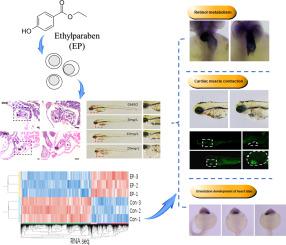Science of the Total Environment ( IF 8.2 ) Pub Date : 2022-06-22 , DOI: 10.1016/j.scitotenv.2022.156785 Zunpan Fan 1 , Yunyi Yang 2 , Peixuan Hu 2 , Yaochen Huang 2 , Liting He 3 , Rui Hu 4 , Kai Zhao 5 , Huiping Zhang 5 , Chunyan Liu 5

|
Ethylparaben (EP), one of the parabens, a ubiquitous food and cosmetic preservatives, has caused widespread concern due to its health risks. Recently, studies have found that parabens exposure during pregnancy is negatively correlated with fetal and early childhood development. However, studies about EP on embryo development are few. In this study, the cardiotoxicity effects of EP concentrations ranging from 0 to 20 mg/L on zebrafish embryo development were explored. Results showed that EP exposure induce abnormal cardiac function and morphology, mainly manifested as pericardial effusion and abnormal heart rate in early-stage development of zebrafish embryos. Through transcriptome sequencing followed by Gene Ontology functional, and Kyoto Encyclopedia of Genes and Genomes pathway analysis, we further confirmed that EP exposure ultimately leads to cardiac morphologic abnormalities via the following three mechanisms: 1. Disruption of the retinoic acid signaling pathway related to original cardiac catheter development; 2. Inhibition of gene expression related to myocardial contraction; 3. Orientation development disturbance of heart tube. Moreover, O-Dianisidine staining, whole-mount in situ hybridization at 30 or 48 hours post fertilization (hpf) and hematoxylin-eosin staining results all confirmed the decreased heart's return blood volume, misoriented heart tubes toward either the right or the middle side, and heart loop defects. For the first time, we explored the mechanism by which EP exposure causes abnormal heart development in zebrafish embryos, laying the foundation for further revealing of the EP toxicity on embryonic development.
中文翻译:

基于转录组分析的对羟基苯甲酸乙酯对斑马鱼胚胎心脏毒性的分子机制
对羟基苯甲酸乙酯(Ethylparaben,EP)是对羟基苯甲酸酯中的一种,是一种普遍存在的食品和化妆品防腐剂,由于其健康风险而引起广泛关注。最近,研究发现,怀孕期间接触对羟基苯甲酸酯与胎儿和儿童早期发育呈负相关。然而,关于EP对胚胎发育的研究很少。本研究探讨了 EP 浓度范围为 0 至 20 mg/L 对斑马鱼胚胎发育的心脏毒性影响。结果表明,EP暴露引起心脏功能和形态异常,主要表现为斑马鱼胚胎早期发育的心包积液和心率异常。通过转录组测序,然后是基因本体功能,以及京都基因百科全书和基因组通路分析,我们进一步证实,EP 暴露最终通过以下三种机制导致心脏形态学异常: 1. 破坏与原始心脏导管发育相关的维甲酸信号通路;2. 抑制心肌收缩相关基因的表达;3.心管定向发育障碍。此外,O-Danisidine 染色、受精后 30 或 48 小时的原位杂交 (hpf) 和苏木精-伊红染色结果均证实心脏回血量减少,心管偏向右侧或中间,和心脏循环缺陷。我们首次探索了 EP 暴露导致斑马鱼胚胎心脏发育异常的机制,


















































 京公网安备 11010802027423号
京公网安备 11010802027423号